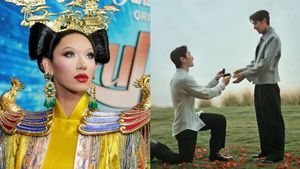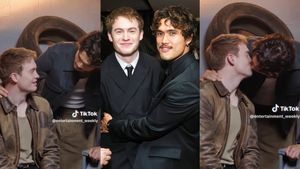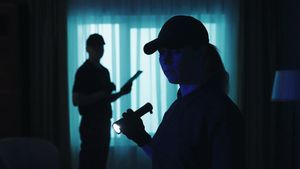This is where the
stillborn babies and dead children go," whispers
Chuck Palahniuk. We're in the children's
tower, a five-story shaft in the massive Portland
Memorial Mausoleum, one of Palahniuk's favorite
landmarks in Oregon's largest city. Under the glow of
a distant skylight, a cherubic fountain tinkles away
in the center of the room, ringed by pink marble
nameplates that stack impressively, tragically, out of view.
In cubbies, on small shelves, parents have left flowers and
windup toys. Members of the city's Cacophony
Society -- a group dedicated to what Palahniuk, a
former participant, describes as "experiential
potlucks" -- once visited the tower and, he
says with characteristic delight, "wound up all
the toys and released them at the same time."
Spend enough time
with Palahniuk and you come to expect these kinds of
statements, this delivery: genuine wonder mixed with a
wicked black sense of humor. We wander the corridors
of the cavernous mausoleum, surrounded by countless
shelves, and Palahniuk pauses in front of an open vault
shrouded by a curtain. "They say the worst sound in
the world is when they take a casket out of its berth
and, as it tips, the entire liquefied contents rush to
the lower end. Just bones and formaldehyde." He tests
a doorknob at random -- he tests all the doorknobs --
and when one turns, he strides into an empty, unlit
storage room. "Sometimes this is where they
hold the indigent bodies," he says. "They put
them in plastic-lined cardboard boxes, and
you'll go in and all the boxes will be collapsed
onto each other."
The gigantic,
maze-like mausoleum ("popular for suicides,"
attests Palahniuk) served as a key setting for his
book Survivor, and he used to write here, in one of
the many empty sanctuaries or one of the dank-looking
armchairs that are scattered around. "I would just
find a big one, one that didn't stink so
much," he says with a shrug. "They've
had water problems for years." Fifteen years ago
Palahniuk even brought his partner here on their first
date. The Cacophony Society had staged a scavenger
hunt inside the mausoleum and he, along with a hundred
others, came dressed in mourning black, carrying calla
lilies. "We just got lost, absorbed into the
building. You couldn't hear another person at
all," he says. And his partner? "Oh, he
hated it."
This tour of the
mausoleum is the first interview Palahniuk has ever
granted to the gay press; his sexuality has previously been
either largely unknown or the subject of endless
rumor. But I sense no apprehension during our time
together. A former machinist, Palahniuk moves with
athletic purpose, as if we need to be somewhere. He's
thin and thoughtful, drives a red pickup truck, and
wears a black T-shirt that reads "Disappointed" in
Disney font. Praise comes easy to him -- praise for
other authors, for his mentor and writing teacher Tom
Spanbauer, for people with obsessions and passions. And with
his company comes a strange -- though, as I would
learn, not absolute -- sense of permission, as though
no subject matter were out of bounds: the utility of
carrots as dildos or the artifacts found on the floors of
sex clubs. "I feel a comfort and absurdity and
freedom that comes in the face of life," he
says. "No mistake will last forever -- all those bad
or good choices you made, you'll still end up
here."
A bright nihilism
pervades Palahniuk's risky, propulsive novels --
including Fight Club, Choke (which has been made into
a feature film due out August 1), and his latest,
Snuff, about the making of the world's
biggest gang bang. But for all their excessive situations
and willful transgressions, these whiplash
entertainments capture a poignant (if extreme and
predominantly male) search for new forms of social
interaction. "All my books are about a lonely person
looking for some way to connect with other
people," Palahniuk writes in Stranger Than
Fiction, his collection of nonfiction. "People
want to see new ways of connecting. See How to Make
an American Quilt or Divine Secrets of the
Ya-Ya Sisterhood. Of course, they are all
women's stories. We don't see a lot of
models for male social interaction. There's
sports and barn raisings. And now fight clubs," a
phenomenon Palahniuk invented and one that persists.
After our
mausoleum tour, Palahniuk admits that our trip itself was a
pretext, a protective device. (Palahniuk declined to be
interviewed at his home, and we agreed not to mention
the name of his partner in the article.) It becomes
clear this search for fresh structures for male
contact is very real to him. He says he experiences a deep
anxiety trying to relate to people without some
activity to bring them together. "In my family
we can't just sit and be together," he says.
"We have to be shelling peas or husking corn or
something. A larger task. Some way of being with
people. I'm not good at it." He and his
partner live in a former church compound outside
Vancouver, Wash., with no neighbors for a mile and a
half in any direction. "That's why we love
it."
Palahniuk's unease and isolation seems a natural
response to his background, which was inflected with
the same ruptures and psychological violence that he
writes about. Born in 1962, he grew up in the desert of
eastern Washington State. At 18, he learned the truth about
his grandparents' deaths: His grandfather shot
his wife and then came after his son,
Palahniuk's father, who was then 4 years old.
"My dad's first memories are of hiding
under a bed, hearing his father call and seeing his
heavy boots walk past, the smoking barrel of the gun hanging
near the floor," writes Palahniuk in
"Consolation Prizes" from Stranger Than
Fiction. While Chuck's father hid, his
grandfather eventually shot himself. For years,
Palahniuk's family vacationed in that same house in
Idaho.
In one of
Palahniuk's own childhood memories, he slipped a
washer around his finger and couldn't get it
off. When his finger was swollen and purple, he went
to his father, who said they'd just have to cut the
finger off and spent the afternoon sharpening his ax.
"There was no drama, no tears, no
panic," he writes. "In my 4-year-old mind, my
father was doing me a favor." Palahniuk knelt
beside the chopping block, where he'd seen
chickens beheaded on the family farm, and laid his hand out.
"If anything, I was wildly grateful to my
father's help," he continues. "I
had never told it to anyone...because I knew people
wouldn't understand the lesson. All
they'd see would be my father's actions and
label it cruelty." His father swung -- and
purposely missed. These are Palahniuk family origin
stories, where the double braid of intimacy and violence
winds so tight they are, like his novels, inseparable -- and
perhaps inescapable.
In 1999,
Palahniuk's father, long divorced from his mother,
was murdered, shot by the ex-husband of a woman he was
dating. Driving home from his father's funeral,
Palahniuk tells the story of pulling over to the side
of the road and considering lying facedown on the pavement
until the police or EMTs arrived, because then they
would have to physically hold him. Ultimately, he
decided not to and instead wrote a book about it --
Choke.
Ironically,
Palahniuk, by most accounts, is very good at being with
people -- as long as it is a lot of people. His readings,
what he deems "events," draw capacity
crowds. He recounts with relish the dozens of people
who have fainted at his performances of
"Guts," a short story from his
collection Haunted that involves masturbation, a pool
intake vent, and a prolapsed colon.
"It's great when that happens," he
says. "There's death, resurrection, and
then afterwards people experience euphoria." A
friend of mine recalls standing in line for a reading and
Palahniuk snuck in behind, eavesdropped, then said in his
ear, "Have you ever had a prostitute hold your
tongue and jab you in the chest with a knife?"
("It was sick!" my friend said with a smile,
clearly having gotten what he came for.) For the
upcoming Snuff book tour, Palahniuk has signed
over 1,000 blowup sex dolls that he will toss into the
audience "to give people a chance to scream and yell
and hyperventilate blowing them up."
Snuff is about nothing but people -- 600 of
them. Porn star Cassie Wright wants to break the world
record for "serial fornication" in a
film called World Whore Three, but Palahniuk has
cunningly placed her (and the sex itself) primarily
offstage. The book is essentially the stories of three
men waiting their turn. Mr. 72, a young Midwesterner
who carries a bouquet of wilting flowers, believes he is
Cassie's long-lost son. Mr. 600 is an aging porn star
who brought Cassie into the business but is so far
gone he can't even recognize himself on the
closed-circuit televisions playing Cassie's hits. Mr.
137, the most complicated of the three, is a gay
television star who participated in his own all-male
gang bang, and the revelation ended his career. By
popping Viagra, he's hoping to burnish his reputation
-- and recast his orientation -- especially since he
thinks Cassie will die while making the film.
Given
Snuff 's raunchy setup, the
novel reads more like theater than hard-core,
unfolding through monologues threaded with tragic
backstory. Not surprisingly, Snuff started out as a
play, but "it was terrible," Palahniuk
says, so he reworked it as a novel. (Palahniuk writes
fast: The first draft of Fight Club took him six
weeks, as did his forthcoming novel Pygmy. He
wrote Snuff in eight weeks.)
Palahniuk does an
enormous amount of research for his books, and for
Snuff's source material he turned to Grace
Quek (a.k.a. Annabel Chong) and her own
"sextravaganza," in which she, at age 22,
engaged in 251 sex acts with 70 men over a period of
10 hours, captured in the documentary Sex: The
Annabel Chong Story. Quek, then a gender
studies graduate student at the University of Southern
California, had been a victim of a gang rape as a
young woman; she said she wanted to "take on
the idea of the stud." Palahniuk loved the ambiguity
of her experience, hovering between empowerment and
annihilation. "Was she exorcising her demons,
or was she just being used?" he asks. "Derrida
says that the undetermined, undecided thing carries enormous
energy. So if I write and refuse to take a moral stand
about Cassie and spoon-feed people, it's much
more dynamic. Readers need to seek out the company of
other people to discuss the themes." (Incidentally,
Quek was never paid for the video, though she claims
in the documentary that she "didn't want
the money.")
To develop his
themes, Palahniuk also conducts experiments in what he
calls "crowd-seeding": At parties he tells
people what he's working on and freely hands
out his phone number to generate ideas. For
Snuff, he says, "I had all these people
calling night and day, offering porn titles, or
hairdressers saying, 'Did you know Lucille Ball
did this thing with wooden
toothpicks...?' " All of his books
are packed with this group expertise "so that
you feel like you're learning," he says.
It's the Google-era technique of novel writing:
social composition. "I'm simultaneously
testing my material or premise with people and
tweaking it," he says. "Plus, it's a
fun game and gives people a role to play."
The fact that his
books assemble such bizarre and obscure facts helps
account for the strong appeal Palahniuk has to young
straight men. Every fall, when I ask my college
students what books they have read, if the boys have
read anything, they've read Palahniuk. The appeal,
they say, is that the books are restless, funny, and
physical, as if they are impatient with being books.
But it's also that they are oddly informative.
"True facts" about the Vatican's drawer
of penises, the origins of the vibrator, and the
legalese of gang bangs filter throughout Snuff.
"It's a guy thing," says Palahniuk.
"Men want to make the best use of time and want to
see how something can inform them and give them a
stronger sense of power."
Of course, these
same male students are surprised to learn that Palahniuk
is gay, and Palahniuk enjoys their surprise.
"It's nice, I like that," he
says. "It's a more accepted part of
people's lives now." As an author known
for exploring the terrain of straight male camaraderie
(Fight Club), demolition crews (Rant), and
now sexual conquest (Snuff), he willfully ducks the
"gay writer" moniker. "I know
people who have spun their nationality or their
sexuality or their race, but after a few books it's
really limiting and their readership doesn't
want them to write about anything other than that
experience," he says. "They find themselves
pigeonholed, documenting the same small aspect of self
over and over." He has not avoided queer
subject matter, though -- Invisible Monsters
features a pre-op transsexual, and Fugitives and
Refugees, a travel book he wrote about Portland,
highlights several gay sex clubs.
At the same time,
Palahniuk's tricky relationship with the public
consciousness of his sexuality has been the subject of
controversy, stemming largely from a 1999 newspaper
profile in which he claimed to have a
"wife" and "was not planning on having
kids." Palahniuk, who says he has been out
"for a million years," claims this was an
inference that the reporter made and is "just
one of those battles you chose to fight or not to
fight. I saw it in print and thought, Oh, well,
what the hell." In 2003, Entertainment
Weekly writer Karen Valby, who declined to be
interviewed for this story, planned to run a feature
on Palahniuk that would discuss his orientation and
relationship. Valby called to clear this with Palahniuk,
and he exploded at her; later, on tour at the time and
"under pressure," he made an incendiary
phone-in post to his blog. "[They] said they
didn't have a story unless they could talk
about me and my partner and describe our lives
together, and it was just so reductive," he tells me.
"Of all the things we'd talked about,
now it boiled down to, Where do you put your dick? I
felt so pissed that I couldn't be a human being, that
the only thing interesting about me was this one
aspect of my persona."
In the post he
revealed personal information Valby had told him about
herself during their interview, saying, "The knife
cuts both ways." When loyal fans heard his
"emotional lashing back," someone phoned in
bomb threats to the Time Warner building. The
EW article eventually ran without the personal
information, and Palahniuk removed the post from his
blog.
To this day his
official author website, run independently, features a
Q&A with Palahniuk that asks, "Is he
married?" His answer, "No, but he has
been in a long-term committed relationship for over a
decade," is certainly true but oddly discreet
for a writer known for his irreverence and lacerating
honesty. Palahniuk doesn't remember being interviewed
for the Q&A and offers, "Maybe it was their
choice to protect my privacy."
Palahniuk says a
fog of rumors follows him -- that he's married to a
former Miss Oregon, that he lives in a castle on the coast,
that he's a Scientologist (he's not) --
and he says he has little interest in policing them.
"Rather than spinning who I am, I'm more
worried about what is going to be the next
book." He calls this "submerging the
I," after the fiction-writing principle of
avoiding the overuse of the first person. But you get
the sense that Palahniuk doesn't mind the rumors
either, since they reflect his charged, indeterminate
reputation; irrelevant writers don't become the
subject of rumors.
The day after
Palahniuk and I spoke by phone, for a follow-up interview,
I contacted the site webmaster to figure out who crafted his
answer to the Q&A. Hours later, Palahniuk pulled
out of the Advocate photo shoot and called to say he
was no longer cooperating with this article. My line
of questioning had somehow triggered his sense of
betrayal, but I was baffled and shocked. That morning,
before the wave of panicked phone calls, I had received a
package from him, crammed with two books we had discussed, a
Whitman's candy sampler, gag gifts, and a fake
severed finger. Oh, and heaps of confetti. ("He
really is gay," said a friend.)
Alongside, he'd written a touching letter.
"Please find joy in everything you do,"
he wrote. "I'll shut up now." Palahniuk
often sends packages like this to his fans, but after
years of working as a journalist -- and Palahniuk is
one himself -- I've never received such a gift,
and I mention this not to reveal his contradictions or
strategies of coercion. Palahniuk says he is
"the animal that eats its own young,"
because he says he could not care less about Fight
Club or any of his novels that have already been
published. But he clearly does care, and deeply, about the
perimeter of his privacy and the ability to turn off the
lights when he wants to.
Palahniuk thinks
a lot about the "liminal" -- those threshold
states of transition, the "experiences between
things," he calls them. Like the Cacophony
Society releasing windup toys in a silent crypt just to hear
them whir. Or 600 men waiting to make their smear on
history. Or a boy waiting for the ax to be sharp
enough. Palahniuk is not in the closet. The whole
question misses the point. But a part of him seems to
recognize the utility of shadows, the function of
mystery. He does not want to be known. At one point in
our conversation Palahniuk asked, only half
rhetorically, "How do you trick people into loving
you? Are you smart? Are you funny?" This is a
genuine question for him, as if connection were a
series of traps. So he stays a moving target, cultivating
transition and keeping slightly out of view. And if
that disappoints his readers, "What are they
going to do, jump to Alice Sebold at this point? To Amy
Tan?" Palahniuk says to me. "God bless them.
At this point they are reading my books because they
like them, not because they like me."


















































































